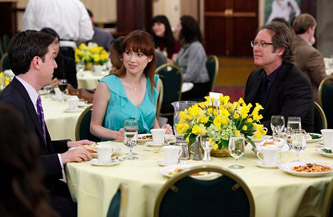Mythology: The Office
By Martin Felipe
May 9, 2012
BoxOfficeProphets.com

You see, if there is a mythology to such a program, it’s that of office life. Yeah, I know, am I not a genius, claiming that the show is about exactly what the title says it should be about? Nevertheless, I posit that even in its maligned eighth season, it stays true to its universe.
Make no mistake, I’ve long been a proponent of the theory that character is the most important quality of storytelling, and The Office loses its central character towards the end of the seventh season. Creatively, yes, Michael Scott’s departure would have been a fitting end to the series. Mythologically, on the other hand, there is an argument to be made for its continuance.
I rewatched the seventh season and it struck me in those last few Scottless episodes that, if the writers handled it well, there was a huge opportunity to explore further angles of 9-to-5 drudgery. While I would agree that the results have been a mixed to negative bag, the very conceit of the show itself justifies a post-Michael era.
Few in the real world of cubicle culture haven’t experienced such an upheaval. A boss leaving, whether that boss is good or bad, creates a power vacuum that can shake the very foundation of the office itself. Disliked though he may be, Will Ferrell’s Deangelo Vickers is exactly the type of thing corporate offices will do in such a situation. They’ll quickly assign someone to fill the void at the regional branch with someone who wants to just come in there and start doing things their own way.
Often, these filler folks don’t last, and corporate will toy with both the idea of promoting from within, as well as holding interviews with outsiders. Again, this is a pretty legitimate direction for The Office to go, fully keeping with its mockery of mid-level corporate monotony.
And then, corporate will do one of two things, hire someone new or promote someone. The Office decides to take both approaches, adding James Spader’s Robert California to the mix, as well as making Ed Helms’ Andy Bernard the new regional manager. Now this was a golden opportunity for the show to go in a bold direction, shaking the very foundation of the show, just as such a development might have shaken a real office.
So, from a standpoint of office mythology, so to speak, The Office handled things just fine. From a creative standpoint, well, that’s for more debatable. Andy, himself a newer cast member, having joined Dunder Mifflin Scranton back in the third season, ends up as more of an extension of Michael Scott. Rather than focusing on what was different about him, the writers choose to keep the comedy relatively unchanged, making the approach Andy has to his tenure as manager as similar to Michael’s as possible.
He desperately wants to be liked… just like Michael. His attempts to unify the employees end in awkward, inappropriate results… just like Michael. His love life crosses professional boundaries… just like Michael. And, like Michael used comedy to ineffectual ends, Andy uses music.
Not only that, but there seems to be very little blowback from Andy’s promotion. Darryl and Dwight in particular seem to get over being passed by very quickly. For that matter, Andy has worked in Scranton for a shorter time than the others. In a real office setting, there would be quite a bit of resentment. Yet, despite a grumble or two, the Dunder Mifflin gang joins together in the second season to reassure Andy that they’re still good with him. Look, if you’re making a show mocking office life, really explore all of the possibilities. Don’t just wash over them in an attempt to reestablish some sort of status quo. Real office status quo changes with a new boss. Run with that.
On the Robert California side, let me tell you, I couldn’t have been more excited for Spader to join the show. In the previous season’s finale, Spader makes the strongest impression of the celebrity interviewees. He was cocky, manipulative, in control, hilarious. Yet in this season’s follow up with the character, the extreme braggadocio and self assured arrogance of the character has been softened. Rather than being the wicked button pusher that he is in his interview, he becomes an erratic, sex obsessed boss type, rarely showing the edge of his first appearance.
Much has also been said of the increasing cartoonishness of the antics on a show supposedly grounded in reality. This doesn’t bother me as much, but it does speak to the argument that all shows have a shelf life. Once they progress beyond inspiration, there is very little writers can do other than amp up the extremities of the situations, the conflicts and the characters. When this starts to happen, there’s your indication that it’s time to start prepping for that series finale.
The Office had a huge opportunity to avoid this pitfall by shaking up the show’s DNA, without losing the central conceit of the show itself. However, rather than trying something different, they keep trying to do the same old Michael stuff with Andy. This results in the exaggerated antics and increased broadening of the characters, which rubs viewers so the wrong way. Opportunity wasted, results disappointing.
The show’s future is uncertain. There is little doubt that there will be a ninth season, but rumors of cast and creator defections abound and most folks expect a pretty big shakeup next year. Some are even throwing around that buzzword “reboot." For my part, I think a big upset would be beneficial for the show creatively, as well as for the office mythology. However, those who appreciate television as art can’t help but feel that the show has exhausted itself. It probably has. Unfortunately, no matter where it goes next, the legacy of a once brilliant show has probably been tarnished. Oh well. We’ll always have Michael in reruns.